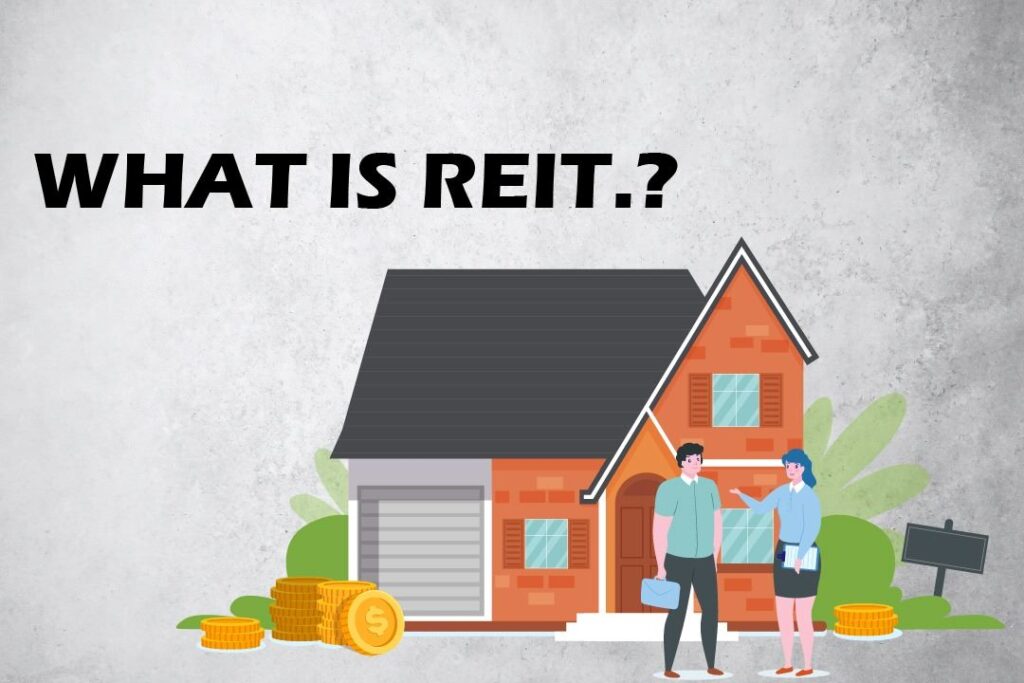Real Estate Investment Trusts (REITs) allow investors to put their money in commercial
properties without actually buying and managing those properties by the investors
themselves. In this article, we’ll cover all the main aspects of REITs including what it is and
how it works. Further, we’re going to discuss its types, pros and cons and why should you be
investing in REIT. So let’s get started with it!
What Is A Real Estate Investment
Trust?

Real Estate Investment Trusts are like mutual funds that own or finance income-generating
real estate. This income-generating real estate includes warehouses, apartments, malls,
hotels, and self-storage facilities. REITs are similar to purchasing a stock and owning a
share but here the investment needs to be in real estate properties. It offers regular income
streams, capital appreciation, and diversification to the investors.
REITs buy real estate projects with the money invested by individuals and institutions. Each
shareholder of a REIT scheme earns a share of the generated income through selling or
renting the real estate property. And unlike other investment companies, REITs don’t resell
the purchased property but they develop real estate properties to operate them as part of
their portfolio.
How Do REIT’s Work?

REITs were created to provide opportunities for all individuals to benefit from investing in
income-generating real estate. The investors of REIT are allowed to own or finance
properties in the same way everyone invests in other industries, through buying a stock. The
shareholders of a REIT earn a share of the income generated through investments in real
estate without going out to buy and develop a property.
The REIT industry is diversified which offers many benefits to the investors. It is classified
into two categories: Equity REITs and mREITs. Equity REITs own property types that
include offices, hotels, shopping centers, apartments, and many more. On the other hand,
mREIT or Mortgage REIT owns both residential and commercial properties. Equity REITs
derive most of their revenue by renting out their properties while mREITs benefit from
interest earned on their mortgage investments.
Congress established a specific set of rules for REITs to operate. A REIT is an entity that is
designed on the model of mutual funds and it is treated by the Internal Revenue Code as a
corporation. The IRS implements rules for an entity to be qualified as a REIT which include:
● 75 percent of the income generated by the corporation needs to be coming from real
estate as rent, interest, or from sales of real estate properties.
● 95 percent of income from the corporation must be passive.
● The assets of the corporation must have at least 75 percent of real estate assets.
● 90 percent of taxable income must be distributed among shareholders annually as
taxable dividends.
The REIT and rules created have evolved to meet the requirements of real estate industries
in the modern world. However, they have remained true to the mission laid out by Congress.
The aim is to make the benefits of income-generating real estate accessible to anyone and
that’s how it works.
What Are The Types Of REIT?

Real Estate Investment Trusts are divided into three categories by investment holdings:
Equality REITs
Equity REITs finances and manages income-generating properties. They operate more like
a landlord. They mainly focus on collecting rent checks and reinvesting into the property.
Thus, the revenues come primarily through rents and they’re not intended to resell the
purchased property.
Mortgage REITs
Mortgage REITs or mREITs provide financing for income-generating properties by buying or
originating mortgages and mortgage-backed securities. mREITs earn income from the
interest generated from investments. For example, when a person takes out a mortgage on
a house, mREIT might purchase that mortgage from the original lender and receive the
monthly payments while generating revenue through interest income.
Hybrid REITs
Hybrid REITs follow the investment strategies of both equity and mortgage REITs. These
REITs own and manage real estate properties as well as commercial property mortgages.
Real Estate Investment Trusts are divided into three types by trading status:
Publicly Traded REITs
Publicly Traded REITs are traded on an exchanges. These REITs can be bought using an
ordinary brokerage account. Publicly traded REITs offer the most liquid stock, which means
investors can buy and sell REITs much faster. According to the National Association of Real
Estate Investment Trusts, there are 200+ publicly traded REITs on the market.
Publicly Non-Traded REITs
Publicly non-traded REITs are registered with the Securities and Exchange Commission
(SEC) but they’re not available on National Stock Exchanges. These REITs can be
purchased from a broker participating in public non-traded offerings. This type of REIT is
highly illiquid because they aren’t publicly traded.
Private REITs
Private REITs are not SEC-registered and they’re unlisted as well, which makes it harder to
value and trade them. Such limitations on Private REITs make them less attractive to
investors.
Pros And Cons Of Investing In REITs
REIT Pros

Portfolio Diversification:
Investment in REITs ensures the diversification of the real estate portfolio. This type of
investment offers diversification away from all other traditional stock market investments.
Investors can even further diversify their portfolio within REITs by focusing on particular real
estate assets such as office REITs, retail REITs, and Healthcare REITs. In addition,
investment in REITs can also diversify your portfolio geographically. They allow investors to
buy properties in different cities, states, and countries.
Higher Returns:
Investors are always looking for opportunities that can provide them with maximum results.
REITs are a good option for investors as they can allow their wealth to grow through steady
capital appreciation over time.
Passive Income:
Investors after making the initial investment don’t have to do anything else to earn a return
on their investment. The REITs do not need investors to manage the properties they own,
rather they hire property management firms and deal with the contractors.
Liquidity:
It takes a while when you’re selling or buying a property. But REITs are exceptional liquid
investments. You can buy and sell REITs much faster which makes them appealing to it
appealing potential investors.
No Corporate Tax:
REITs can claim special tax treatment as long as they abide by the rules set by the IRS. The
REITs are not taxed on the entity level but the income is passed through to the shareholders
and they are taxed at the individual level. This not only helps in avoiding double taxation but
also drives higher returns for investors.
Easy To Get:
REITs are easy to invest in and they’re available to almost any investor either it be large or
small as long as they have a brokerage account and a sufficient amount of money to buy at
least one share of publicly traded REIT.
REIT Cons

Tax On Dividends:
Remember to note that the dividends are often taxed at a significantly higher rate. These
dividends are taxed as ordinary income.
High Potential Fees:
The non-traded REITs can charge investors with a high up-front fee. These REITs are more
likely to have annual management fees and it is very much possible that the management
team takes a percentage of profits in the form of promoted interest.
Sensitive To Interet Rates:
REITs can be very sensitive to changes in interest rates. The higher interest rate might pose
trouble for REITs prices. The sensitivity to interest of REITs is because the value of trust is
tied to the treasury yield, so in case the yield increases the value of REIT is more likely to
decrease.
Trends Can Affect Value:
Trends can affect REITs. For example, if someone invests in REIT with a portfolio of
garments shop in a mall then they could see their investment going rapidly down if the mall
or garments fall out of trend.
Should I Invest In REIT?
REITs are the best options for investors who have just entered into real estate or those who
want to have stable cash flows from properties that are well-diversified. REITs, not all but
most of them are non-traded which means they don’t have to list their shares on an
exchange. Considering the above facts, most of the REITs are more likely to be illiquid and
investors will have to wait for the REIT to liquidate which normally happens after 5 5-year
period. Therefore, REITs won’t be a good option if you need liquidity. However, if you’re
looking to add large-scale real estate properties to your portfolio then REITs are a great
option for you.
Conclusion
In conclusion, Investment in Real Estate Investment Trusts favors investors who are willing
to diversify their portfolios. Such investors won’t only get higher returns on their investments
but their income is more likely to be passive. In addition, REITs are easy to get, investors
with small or large investments are eligible as long as they have a brokerage account and
enough money to buy at least one share of a publicly traded REIT. Real Estate Investment
Trusts are divided into types by investment holding and by trading status. Investors can
select any type depending on the amount of cash they have and their personal preferences.
However, investors need to thoroughly go through the downsides of REITs and adopt the
strategy that is useful in tackling the downsides of REITs.
